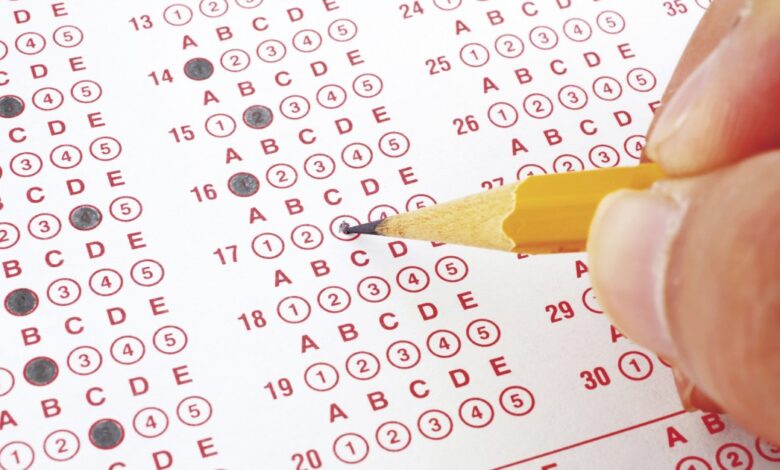‘U.S. News’ Keeps ACT and SAT Scores in the Mix — for Now

Though more and more colleges are dropping their ACT and SAT requirements, test scores still count in the closely watched college rankings many folks love to hate. But that might not hold true for much longer.
U.S. News & World Report, which published its latest Best Colleges guide on Monday, once again factored incoming students’ average test scores into its measure of “student excellence” at each ranked college despite recent calls for the publication to remove the ACT and SAT from its methodology. This year, standardized-test scores were weighted at 5 percent of an institution’s overall ranking, the same as last year (down from 7.75 percent previously).
But U.S. News did change one part of its methodology in an acknowledgment of the growing number of test-optional colleges. It’s known as the 75-percent rule. Previously, the publication reduced the weight of the ACT and SAT by 15 percent for test-optional colleges with fewer than three-quarters of incoming students submitting scores. “The lack of data, for 25 percent of students or more, likely means the ACT or SAT score is not representative of the entire class,” Robert Morse, chief data strategist at U.S. News, explained in a 2016 blog post. Some enrollment officials have said the policy — which can lower a college’s ranking — penalizes institutions that don’t require standardized tests.
This year, U.S. News lowered the threshold to 50 percent: Colleges received “full credit for their SAT/ACT performance” if at least half of their incoming students submitted a score. Just 4 percent of nearly 1,500 ranked colleges did not meet that 50-percent threshold. But “many” colleges, Morse wrote in an email, fell somewhere between 50 percent and 75 percent, though he and a U.S. News spokeswoman declined to say how many “many” was.
This is some in-the-weeds geekery, for sure, but the new threshold reflects how the landscape of college admissions is shifting. The policy change, U.S. News said in a news release, was made in response to “the growth of test-optional policies through the 2019 calendar year and the fact that the coronavirus impacted the fall-2020 admission process at many schools.”
It’s worth emphasizing here that the latest U.S. News rankings are based on fall-2020 admissions data, mostly reflecting the test-taking period from 2019 to early 2020. That was before Covid-19 shut down testing centers, prompting colleges throughout the nation to re-evaluate their often-conflicted relationship with standardized tests. Hundreds of colleges either adopted test-optional policies or went test-free, removing the ACT and SAT from evaluations of all applicants.
In short, the testing status quo has changed drastically since the high-school Class of 2020 graduated. In the just-completed 2020-21 admissions cycle, 43 percent of students using the Common Application submitted a test score to at least one college, down from 77 percent the previous cycle, according to a recent analysis. Looking ahead, nearly three-quarters of institutions granting bachelor’s degrees won’t require the ACT or SAT of applicants for fall-2022 admission, according to a recent tally by the National Center for Fair and Open Testing, known as FairTest. Many colleges that required tests before the pandemic plan to extend their test-optional or test-free policies into 2023 and beyond.
U.S. News said in an email to The Chronicle that for freshmen who enrolled in 2020, “standardized tests were required for admission at a large percent of U.S. schools and served as key criteria for whether they were admitted.” All right. But the next round of U.S. News rankings will capture an admissions cycle in which those scores were not required — or even considered — by a large majority of colleges. That should cause even testing proponents to question the utility of ACT and SAT scores as a metric of student excellence or a means of comparing one college to another.
In July, New America’s higher-education team wrote an open letter to U.S. News that urged it to remove testing from its rankings methodology. “Using average scores of incoming students to rank an institution has never made sense,” the letter from the think tank said, “but is even more preposterous during a deadly pandemic.” The letter was co-signed by FairTest, the National Association for College Admission Counseling, and the Institute for College Access and Success, among other associations and scholars.
New America asked U.S. News to do what another best-selling college guide had already done. In March, the Fiske Guide to Colleges, a widely used source of information for applicants and parents, announced that it would stop publishing ACT and SAT score ranges for the 325 colleges listed in its pages. Edward B. Fiske, the guide’s creator and editor, told The Chronicle that the change was “simply the right thing to do in the current context.”
The latest edition of the Fiske Guide explains the rationale for removing test scores: “Unless the published score ranges reflect the scores of all freshmen, not merely those who were able to take the tests and chose to submit scores, the usefulness of these score ranges for assessing both an applicant’s chances of admission and where they would fit into the academic environment of the school is seriously compromised. Incomplete, and thus misleading, scores serve no one’s interest.”
The ‘Test-Free’ Complication
If you stand back and look at how U.S. News has tweaked its rankings in recent years, you will see a rankings enterprise scrambling to account for significant changes in testing requirements. Let’s consider, for instance, how the recent rise of test-free colleges has complicated things. As of early 2020, there were just two test-free colleges, and it was then U.S. News policy to exclude such institutions from the rankings and instead categorize them as “Unranked.”
Then came Covid-19, which prompted dozens of colleges, including the California Institute of Technology, to adopt test-free policies, at least temporarily. Lo and behold, last summer U.S. News announced that it would it stop excluding test-free colleges from the rankings. “Prospective students and their families want to know the academic quality of all schools,” two U.S. News officials wrote in a 2020 blog post, “including ones that do not make use of standardized-test scores.”
For students applying for fall-2022 admission, 84 campuses won’t consider ACT or SAT scores for all applicants, according to FairTest. But here’s a wrinkle: U.S. News currently ranks test-free colleges by assigning them a proxy ACT and SAT score. “Having no test scores was treated as equal to having the lowest test scores” in a college’s rankings category, Morse wrote in an email.
That was “done out of fairness,” he said, so that a test-free college “could not score higher on the SAT/ACT ranking indicator than a school that made use of SAT/ACTs.” But there’s another way to look at it, of course: Colleges that have chosen not to consider test scores get dinged for that choice in the most closely watched rankings in the universe.
Still, the many technicalities and slight year-to-year shifts in the U.S. News methodology arguably matter less than the fact that test scores factor into an ordinal list of colleges’ supposed excellence in the first place. For the record, test scores, just 5 percent of a college’s overall ranking, carry a lot less weight than its “academic reputation,” as rated by presidents, provosts, and admissions deans at other institutions. That controversial metric, long derided as a popularity contest, accounts for 20 percent of a college’s ranking.
But the inclusion of ACT and SAT scores sends a powerful message about what matters in higher education and what “student quality” means. As New America wrote in its letter, the Best Colleges guide’s “impact on consumers and institutions alike cannot be overstated.”
Given that many institutions are rethinking the utility of standardized tests, if not scuttling their requirements altogether, it’s more than fair to question whether the most prominent rankings regime should continue to include them in its formula. Many campus leaders have decided that clinging to tests no longer makes sense. The self-appointed judge of colleges must continue to adapt to that reality.
Source link






